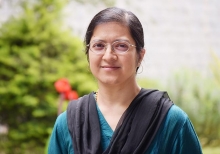Professor Rupa Chanda nominated to WHO’s Review Committee: She is part of the team of world experts who will suggest ways of strengthening global health security

AUGUST 14, 2015: Dr. Rupa Chanda, Professor of Economics, Indian Institute of Management Bangalore, has been nominated to the WHO’s International Health Regulations 2016 Review Committee, which has been set up by the Director General of the WHO, Geneva. The Committee has been appointed with the task of reviewing the International Health Regulations (2005) with a view towards strengthening global health security. The Committee will provide its inputs and recommendations to the World Health Assembly in May 2016.
Professor Rupa Chanda has been with IIMB since 1997. Prior to joining IIMB, she was an Economist at the International Monetary Fund in Washington, DC. Her research interests concern the WTO, international trade in services, regional integration and migration. She has published extensively and has presented her work at conferences, workshops, and seminars, both nationally and internationally. She has authored two books, namely, Integrating Services in South Asia: Trade, Investment, and Mobility and Globalization of Services: India’s Opportunities and Constraints in 2002, co-authored a book titled, Legal Services Liberalization and Reforms in India: Perspectives and Dynamics, edited a book titled, India’s Trade in Services: Prospects and Strategies in 2006 and co-edited two books titled Trade in Services and Trade Agreements: The Case of India and the European Union and India-EU People Mobility: Historical, Economic and Regulatory Dimensions.
The IHR 2016 Review Committee consists of experts with a broad mix of scientific expertise and practical experience in public health, security, law and trade. The members are some of the leading experts in the world in their respective fields and will act in their personal capacities.
Many of the Review Committee Members have extensive governmental experience and expertise – and consulting with WHO – in the areas that are the subject of the Review Committee proceedings, which were considered very relevant and important for the challenging tasks faced by the Committee.
At the World Health Assembly in May 2015, Member States determined a mandate for a Review Committee of the International Health Regulations (IHR) with the following objectives:
• to assess the effectiveness of the International Health Regulations (2005) with regard to the prevention, preparedness and response to the Ebola outbreak, with a particular focus on notification and related incentives, temporary recommendations, additional measures, declaration of a public health emergency of international concern, national core capacities, and context and links to the Emergency Response Framework and other humanitarian responsibilities of the Organization;
• to assess the status of implementation of recommendations from the previous Review Committee in 2011 and related impact on the current Ebola outbreak;
• to recommend steps to improve the functioning, transparency, effectiveness and efficiency of the International Health Regulations (2005), including WHO response, and to strengthen preparedness and response for future emergencies with health consequences, with proposed timelines for any such steps.
For more details, please see: http://www.who.int/ihr/review-committee-2016/en/
Professor Rupa Chanda nominated to WHO’s Review Committee: She is part of the team of world experts who will suggest ways of strengthening global health security
AUGUST 14, 2015: Dr. Rupa Chanda, Professor of Economics, Indian Institute of Management Bangalore, has been nominated to the WHO’s International Health Regulations 2016 Review Committee, which has been set up by the Director General of the WHO, Geneva. The Committee has been appointed with the task of reviewing the International Health Regulations (2005) with a view towards strengthening global health security. The Committee will provide its inputs and recommendations to the World Health Assembly in May 2016.
Professor Rupa Chanda has been with IIMB since 1997. Prior to joining IIMB, she was an Economist at the International Monetary Fund in Washington, DC. Her research interests concern the WTO, international trade in services, regional integration and migration. She has published extensively and has presented her work at conferences, workshops, and seminars, both nationally and internationally. She has authored two books, namely, Integrating Services in South Asia: Trade, Investment, and Mobility and Globalization of Services: India’s Opportunities and Constraints in 2002, co-authored a book titled, Legal Services Liberalization and Reforms in India: Perspectives and Dynamics, edited a book titled, India’s Trade in Services: Prospects and Strategies in 2006 and co-edited two books titled Trade in Services and Trade Agreements: The Case of India and the European Union and India-EU People Mobility: Historical, Economic and Regulatory Dimensions.
The IHR 2016 Review Committee consists of experts with a broad mix of scientific expertise and practical experience in public health, security, law and trade. The members are some of the leading experts in the world in their respective fields and will act in their personal capacities.
Many of the Review Committee Members have extensive governmental experience and expertise – and consulting with WHO – in the areas that are the subject of the Review Committee proceedings, which were considered very relevant and important for the challenging tasks faced by the Committee.
At the World Health Assembly in May 2015, Member States determined a mandate for a Review Committee of the International Health Regulations (IHR) with the following objectives:
• to assess the effectiveness of the International Health Regulations (2005) with regard to the prevention, preparedness and response to the Ebola outbreak, with a particular focus on notification and related incentives, temporary recommendations, additional measures, declaration of a public health emergency of international concern, national core capacities, and context and links to the Emergency Response Framework and other humanitarian responsibilities of the Organization;
• to assess the status of implementation of recommendations from the previous Review Committee in 2011 and related impact on the current Ebola outbreak;
• to recommend steps to improve the functioning, transparency, effectiveness and efficiency of the International Health Regulations (2005), including WHO response, and to strengthen preparedness and response for future emergencies with health consequences, with proposed timelines for any such steps.
For more details, please see: http://www.who.int/ihr/review-committee-2016/en/
